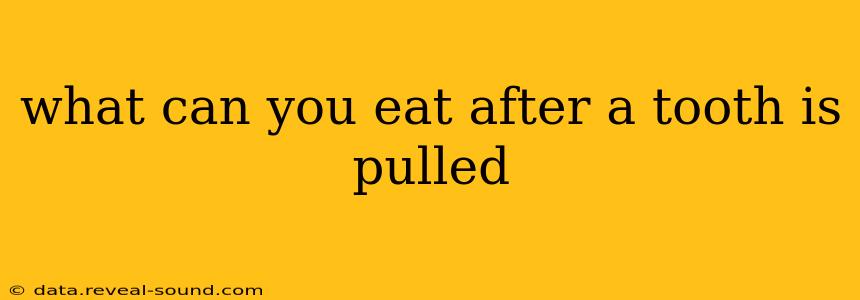What Can You Eat After a Tooth Extraction? A Guide to Post-Extraction Diet
Having a tooth pulled can be a somewhat unsettling experience, but the recovery process is crucial for proper healing. A key component of that recovery is your diet. What you eat (and what you avoid) in the days and weeks following your extraction significantly impacts your healing and reduces the risk of complications. Let's explore the dos and don'ts of post-extraction eating.
What Should I Eat After a Tooth Extraction?
Immediately after the procedure, your dentist or oral surgeon will likely advise you to stick to liquids or very soft foods. This is to minimize any disruption to the blood clot forming at the extraction site. The goal is to avoid disturbing the clot, as this can lead to a painful and potentially serious complication called dry socket.
Here's a breakdown of suitable foods:
-
Liquids: Smoothies (avoid those with seeds or chunks), broth, protein shakes, yogurt (full-fat for better healing), and milkshakes are excellent choices in the first 24-48 hours. Ensure they are cool or room temperature to avoid irritation.
-
Soft Foods: Once you feel comfortable, you can gradually introduce soft foods like applesauce, mashed potatoes, pudding, scrambled eggs (well-cooked), oatmeal (without nuts or seeds), and well-cooked pasta. Remember to avoid anything that requires excessive chewing.
-
Nutrient-Rich Options: Focus on foods that are rich in protein and nutrients to support healing. These include lean proteins like chicken, fish, and beans (well-cooked and easily mashed).
As your healing progresses, you can gradually reintroduce more solid foods, but always proceed with caution. Pay attention to your comfort level and avoid anything that might cause pain or put pressure on the extraction site.
What Foods Should I Avoid After a Tooth Extraction?
It's equally crucial to know which foods to steer clear of after a tooth extraction. These foods can disrupt the healing process or cause pain:
-
Foods Requiring Chewing: Avoid anything that needs significant chewing, such as steak, crunchy vegetables (like carrots or celery), nuts, seeds, popcorn, and hard candies. These can dislodge the blood clot.
-
Spicy Foods: Spicy foods can irritate the extraction site and cause discomfort.
-
Acidic Foods: Acidic foods and drinks like citrus juices, tomatoes, and carbonated beverages can also irritate the healing area and delay the healing process.
-
Hot Foods: Avoid very hot foods and drinks as the heat can cause discomfort and increase inflammation.
-
Straws: The suction created by using a straw can dislodge the blood clot, leading to a dry socket. Avoid using straws for at least a week.
How Long Should I Stick to a Soft Food Diet After Tooth Extraction?
The duration of your soft food diet will vary depending on the complexity of the extraction and your individual healing process. It's generally recommended to stick to a soft food diet for at least a week. After that, you can slowly introduce firmer foods as you feel comfortable. If you experience any pain or discomfort, return to softer foods. Always consult with your dentist or oral surgeon if you have any concerns.
What if I Develop a Dry Socket?
A dry socket is a painful condition that can occur if the blood clot at the extraction site is dislodged. Symptoms include severe pain, a bad taste in your mouth, and a visible empty socket. If you suspect you have a dry socket, contact your dentist or oral surgeon immediately. They can provide treatment to alleviate the pain and promote healing.
Can I Drink Alcohol After a Tooth Extraction?
It's best to avoid alcohol for at least 24 hours after a tooth extraction, as it can increase bleeding and hinder the healing process. Follow your dentist's advice regarding alcohol consumption after your procedure.
By following these guidelines and paying close attention to your body's signals, you can ensure a smooth and comfortable recovery after your tooth extraction. Remember, maintaining good oral hygiene is also crucial during this time. Regular rinsing with a saltwater solution can help keep the area clean and prevent infection. Always consult your dentist or oral surgeon for personalized advice and to address any concerns you might have.
